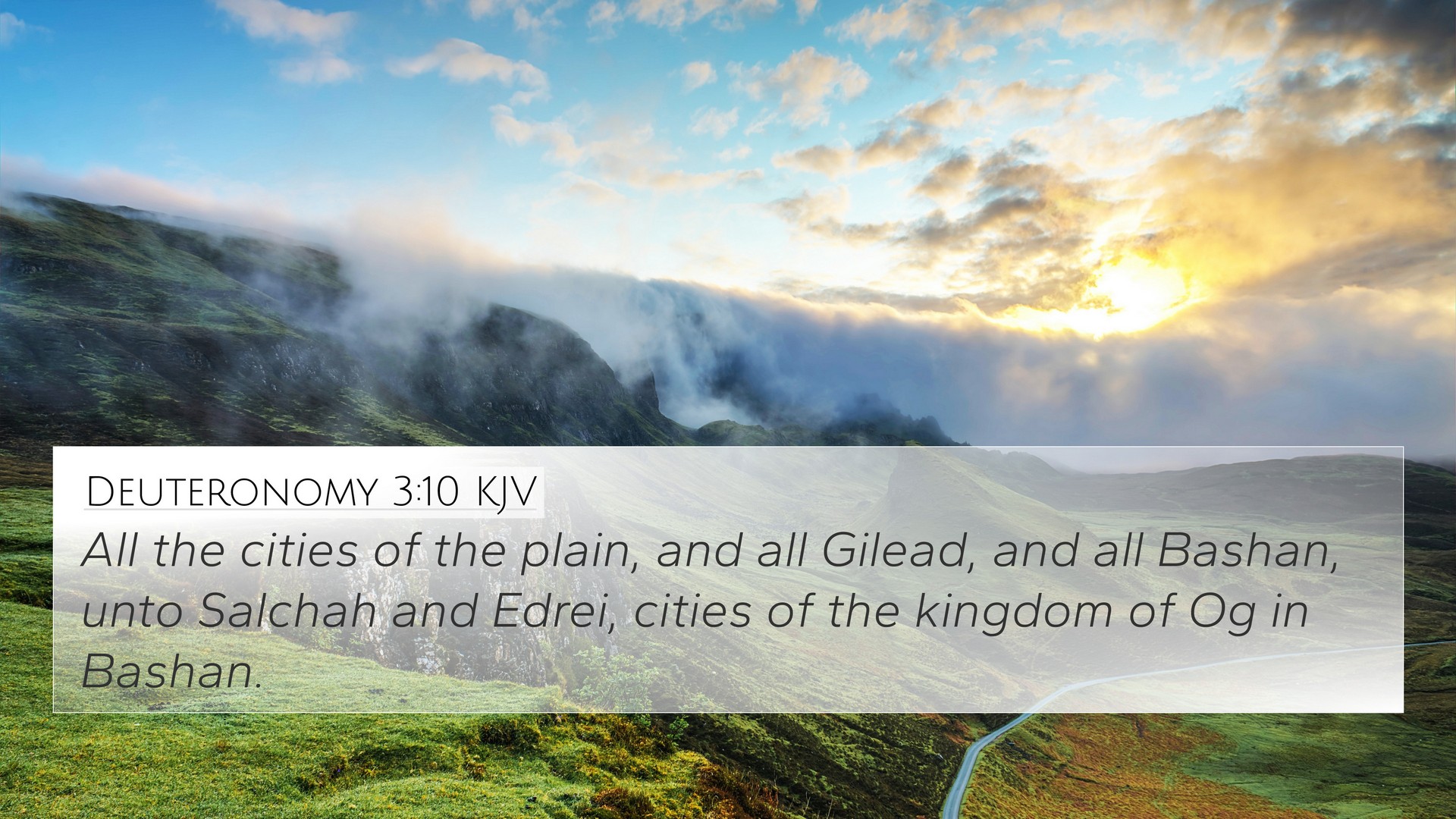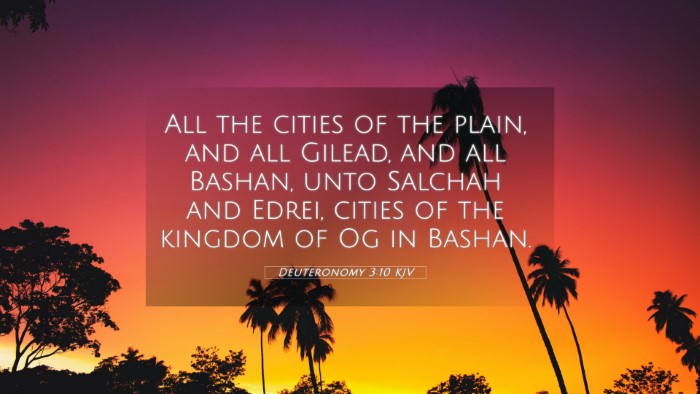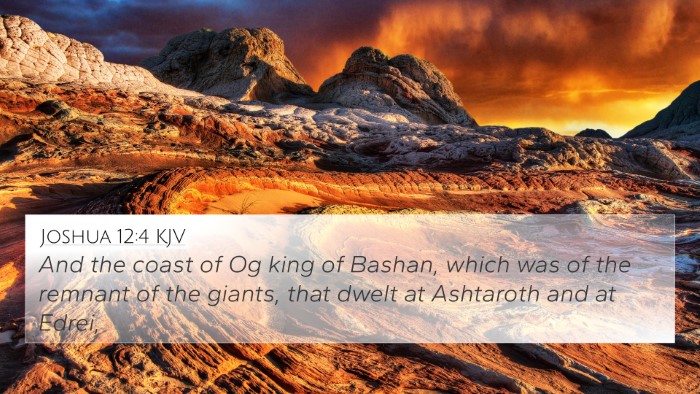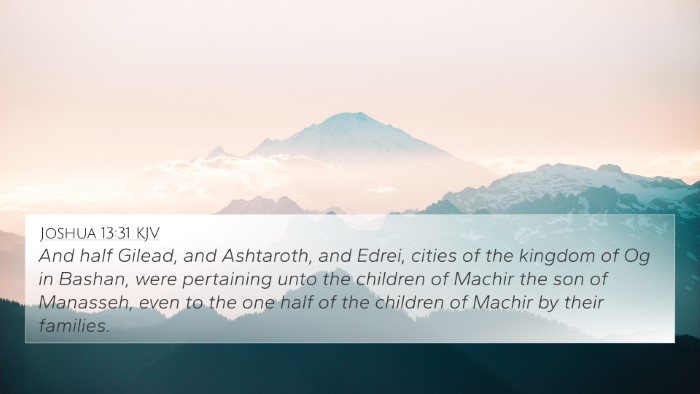Understanding Deuteronomy 3:10
Verse: "All the cities of the plain, and all Gilead, and all Bashan, which was called the land of giants."
Summary of Biblical Context
Deuteronomy 3:10 presents an important geographical and historical context regarding the land conquered by the Israelites. This verse is situated within the narrative of the Israelites as they journeyed to take possession of the land promised to them by God, following their Exodus from Egypt. The mention of Bashan and the reference to giants highlight significant encounters and God’s power working through Israel's leaders.
Commentary Insights
Insights from Matthew Henry, Albert Barnes, and Adam Clarke provide a comprehensive understanding of this verse:
- Matthew Henry: He emphasizes the significance of the cities mentioned and their names, noting that they were not merely geographical markers but also representative of the enemies that opposed God's people. Henry suggests that the term "land of giants" signifies both the formidable nature of the inhabitants and a testament to God's ability to deliver Israel from formidable threats.
- Albert Barnes: Barnes draws attention to the historical context of Bashan, calling it a region noted for its rich pastures and robust livestock. He explains that the mention of "giants" refers to the Rephaim, a race of warriors, which again underscores the display of God’s might in aiding Israel to overcome these formidable adversaries. Barnes further states that this victory is a reminder of God’s promise to Israel of possessing the land flowing with milk and honey.
- Adam Clarke: Clarke provides a detailed examination of the names and geographical bounds. He connects Bashan with the broader narrative of the conquest, elucidating how the Israelites received the land through divine intervention. He suggests that these cities served both as a testament to God’s faithfulness and as warning against pride, given the great size of their previous inhabitants.
Cross References
Deuteronomy 3:10 is interconnected with various other scripture passages that enhance its meaning and provide a deeper understanding:
- Genesis 14:5: The battle against the Rephaim highlights the historical presence of giants in the land.
- Numbers 13:33: The account of the Israelite spies who report seeing giants in the land of Canaan.
- Deuteronomy 2:20-21: Recounts the nature of the giants and God's command regarding the land of the giants.
- Joshua 12:4: Lists the kings defeated, including the king of Bashan, providing historical context to Israel's conquests.
- Psalm 22:12: "Many bulls have compassed me: strong bulls of Bashan have beset me round." This verse invokes the imagery of Bashan’s might and its symbolism in Scripture.
- Isaiah 13:2: The mention of the "high mountain" can be seen as an allegorical defense emblematic of God’s promises, connecting to the might of Bashan.
- Micah 7:14: This speaks of God’s shepherding of Israel, linking to the broader prophetic context of God’s promise to His people.
- Acts 13:19: Cross-referenced as it details the conquest of the seven nations in Canaan, establishing continuity between testaments.
- Romans 8:31: Reinforces the theme of God’s omnipotence, asking, “If God be for us, who can be against us?” in the context of conquest.
- Hebrews 11:30-34: Illustrates faith in action, showing how by faith the walls of Jericho fell after Israel marched around, linking to broader themes of conquest.
Thematic Connections
This verse opens up thematic connections that illustrate God’s faithfulness and power:
- Faith and Assurance: The victory over giants builds a narrative of faith against overwhelming odds, akin to themes found in Hebrews 11.
- Divine Strength: God's strength showcased in overcoming barriers, seen throughout the journey of Israel.
- Covenantal Faithfulness: Each conquest validates God's promises to Israel, establishing a pattern of divine intervention.
Practical Reflections
In applying Deuteronomy 3:10 to contemporary life, believers are reminded of God's omnipotence against even the most daunting challenges. The historical context serves as an encouragement that what seems insurmountable through human eyes can be addressed through faith in God’s promises.
Tools for Bible Cross-Referencing
To deepen the understanding of Deuteronomy 3:10 and its connections to other scriptures, consider using:
- Bible Concordance: A useful tool to locate passages and their occurrences throughout scripture.
- Bible Cross-reference Guide: Guides that help in finding links between verses and themes.
- Comprehensive Bible Cross-reference Materials: Resources that compile extensive cross-reference information across the biblical text.
Conclusion
The study of Deuteronomy 3:10, enriched by historical context and cross-referencing various biblical texts, reveals deep insights into God’s interaction with His people. It encourages believers to engage actively with scriptures, drawing connections and understanding the overarching narrative of faith, promise, and divine power throughout the Bible.







